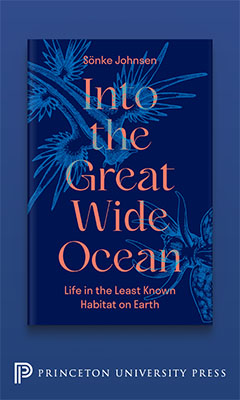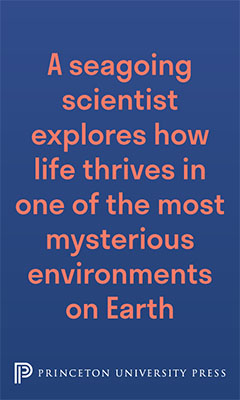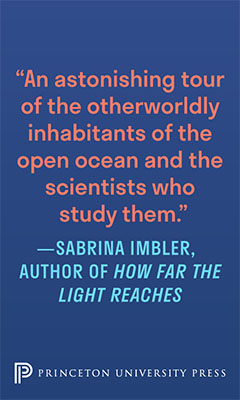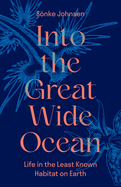Into the Great Wide Ocean: Life in the Least Known Habitat on Earth
by Sönke Johnsen
Sönke Johnsen admits that, "unlike most marine biologists, I don't even live on the coast" but, rather, some two hours away via interstate highway. However, his obsession with the open water has been lifelong, initially fueled by annual childhood family trips from Pittsburgh to Kill Devil Hills on North Carolina's Outer Banks. In Into the Great Wide Ocean: Life in the Least Known Habitat on Earth, Johnsen deftly, humorously, lovingly combines his childhood awe and his many discoveries--both marine and human--delving into the deep blue seas.
Johnsen's "love for the ocean eventually propelled [him] to graduate school in marine biology"; he's now the Ida Stephens Owens Distinguished Professor of Biology at Duke University. That trajectory, however, was as roundabout as it was random--arriving from "a nomadic life of teaching kindergartners, programming computers, and renovating houses." When he and a friend decided they needed more education, they chose what to study by going through the alphabet, Johnsen settled quickly on "b" for biology (his friend went with "e" for education): "Thirty-five years later, we're still living out the decisions we made in that half-hour drive."
Johnsen selected the University of North Carolina, "mostly because I thought Chapel Hill was closer to Kill Devil Hills than it turned out to be." His ah-ha moment took another six years: "The animals out there look nothing like the animals on land or near shore," his grad school mentor told him. "In that moment everything in my life changed, as I became aware of an immense world that had always been right there, waiting for me to notice." And so--applications, rejections, detours aside--to the great, wide ocean Johnsen went. His first research cruise was a "trial by fire"--the realities of seasickness, privations, indignities--but he was there, "on the ocean, out of sight of land, exploring it with nets, instruments, and a manned submersible. It was then I learned that I never knew the ocean at all."
So far from shore in the seemingly endless expanse, the animals proved magical. "What on earth is that?" was a common refrain. Marine animals that live in the open waters must navigate habitats without a bottom floor or a reef (or anything stationary) while maintaining a sustainable depth to avoid being crushed by changing water pressure. They must also find food without becoming food themselves--"They seem alien because the ocean is an alien world to us." And yet most of the earth is water, which means "to know the ocean is to know our planet."
In (mostly) one-word-titled chapters, Johnsen explores--and deciphers as plainly as possible--the often mind-boggling adaptations necessary to thrive in the pelagic portion of the ocean. Pelagic, he explains, "is everything that is not the bottom, which includes the surface and the watery world between it and sea floor." Within these pages, interspersed with wondrously intricate black-and-white line drawings by Marlin Peterson, Johnsen highlights the pelagic animals that exist "particularly in the top 1000 feet"--their buoyancy, their sight (or lack thereof), their movements and migrations, feeding, camouflaging, reproducing, and establishing relationships within and between species.
Interwoven with pelagic encounters are frustrating, funny, inspiring stories of the people who study the boundless waters, along with the technology to make all that happen. What may sound like improv comedy--"At sea, plan A never works, and plan B is usually a pipe dream, so you're left with plan C or--more often--plan D, which you built out of old ladders, spackle tubs, and duct tape on the back deck at 3 AM"--is very much reality. Nonetheless, the rewards are immeasurable: intense, intimate camaraderie with colleagues and crew and the infinite satisfaction (delight, elation, glee) of discovering life that has rarely, if ever, been seen. Always looming is the realization of the vastness of not knowing. "We don't know much about pelagic communities," Johnsen acknowledges, although he astutely counters with plenty of "why we don't know it."
Johnsen is an amusing, friendly writer, regularly using "I," "you," and "we" to create what reads like a warm chat. He never shies away from exacting science but effortlessly translates complicated details into easily understandable descriptions: fish with swim bladders deflate via burping or flatulence to dive back down. Compelling tidbits appear on almost every page: male octopuses hand their mates a "nuptial gift" during insemination; parasitic shrimp lay eggs in a hollowed-out salp corpse that the newly hatched babies will then eat; the 13,000-mile round-trip journey of elephant seals to birth their pups every December on Año Nuevo State Park beach near Santa Cruz, Calif. As for his human communities, Johnsen convincingly concludes, "It turns out that 23 people more or less randomly put on a small boat in the middle of the sea can get along, pull together as a team, and accomplish great things." --Terry Hong








